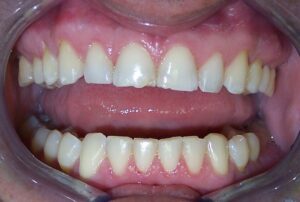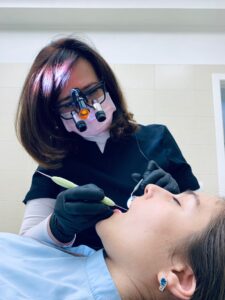What to Do if You Chip Your Tooth While You’re Rockin’ Around the Christmas Tree
 We know the chances might be lower this year than in years past. Maybe there will be fewer Christmas parties in response to the pandemic. But maybe more people will be living it up at home in their jammies with their own household!
We know the chances might be lower this year than in years past. Maybe there will be fewer Christmas parties in response to the pandemic. But maybe more people will be living it up at home in their jammies with their own household!
Whatever may be the case, here is what you need to know if a Christmas accident makes you start singing, “All I Want for Christmas . . .” (Sorry. We know that will get stuck in your head. We couldn’t resist.)
A Chipped Tooth that Does NOT Need Emergency Treatment
We know from years of helping patients with chipped teeth that it is difficult for you to determine whether or not to call us for emergency treatment. We will give you specific information to help you know when you should call us in a panic, and when you should sit back with another candy cane martini. (Just be careful with the glass, will you?)
 The following are characteristics of a chipped tooth that does NOT require emergency treatment. If the items on this list apply to your situation, you can wait until our office is open for cosmetic repair of the tooth.
The following are characteristics of a chipped tooth that does NOT require emergency treatment. If the items on this list apply to your situation, you can wait until our office is open for cosmetic repair of the tooth.
- You cannot see the chip, but you feel a rough or sharp edge with your tongue.
- You can see the chip, and it appears that you are missing less than a quarter of your exposed tooth.
- You have no sensitivity when you breathe in cold air or take a drink of a cold beverage. Does that candy cane martini make it hurt?
- When you inspect the broken area of the tooth, you do not see anything red, pink or bleeding.
How Do We Repair This Type of Chipped Tooth?
Great question! This answer will prepare you for what to expect when you come see us for the repair.
 With a chipped tooth that meets those descriptions listed above, we can typically repair it with a perfectly matched, tooth-colored composite restoration. When the tooth is not sensitive, this procedure does not require any local anesthetic.
With a chipped tooth that meets those descriptions listed above, we can typically repair it with a perfectly matched, tooth-colored composite restoration. When the tooth is not sensitive, this procedure does not require any local anesthetic.
It is a simple procedure in which Dr. Ann gets to show off her artistic skills by rebuilding your tooth to perfect shape, size and color. There is a little drilling involved, as she must round off any sharp edges and smooth the transition between the tooth and the restoration. In general, this is a painless, quick procedure.
A Chipped Tooth that DOES Need Emergency Treatment
An injury to the mouth can lead to a chip that is more severe and does require an emergency visit. (The good news is that most of them do not . . .) The reason emergency treatment is necessary is to prevent the tooth from getting progressively worse or an infection from developing.
Here are a few conditions of a serious chip that would require dental treatment as soon as possible.
- You feel a sharp pain from any pressure, airflow, or cold liquid touching the exposed tooth.
- The tooth feels loose.
- You develop a swelling in the gums near the tooth’s root.
- When you inspect the broken face of the tooth, you can see a red or pink dot and/or notice bleeding from the tooth itself (not the gums around the tooth).
How Do We Repair This Type of Chipped Tooth?
The types of dental treatment necessary for a severe chipped tooth range widely, depending on the specific problem. The list above covers several different problems of tooth injuries, and they each require different types of treatment.
Treatment for Painful Chipped Teeth
When the injury breaks away a significant portion of tooth structure, the tooth may become painful or sharply sensitive to any stimulus. If your chipped tooth is preventing you from being able to eat or speak comfortably, you need to seek urgent care. The quickest treatment to alleviate your symptoms is covering the broken portion with a tooth-colored filling material. This will seal out the painful or uncomfortable sensations to keep them from reaching the nerve.
Because the purpose of this emergency treatment is to stop pain, it may not constitute the final treatment for the tooth. You may require additional treatment in the future to improve the cosmetic appearance of the tooth.
Treatment for Loose Teeth
If the chipped tooth also feels loose, you may need emergency treatment to stabilize it. A minor looseness will typically tighten up on its own if you remove all pressure from it (i.e. no chewing!). If you can see the tooth moving, then it is more than just a minor looseness. We need to help it tighten its connection to the surrounding jawbone. To do this, we will apply a splint that holds the tooth in a stationary position. The splint is temporary, and we remove it after a few weeks of stabilization.
Treatment for Infected or Exposed Nerves
More serious cracks in the tooth can expose the nerve inside. If the hollow chamber of the tooth is open to the oral environment, it becomes contaminated by bacteria. If a chipped tooth becomes infected, you may develop a swelling or pimple-like bump at the end of the tooth’s root. Both of these scenarios require removal of the nerve through a root canal treatment.
Delaying root canal treatment could result in a severe toothache and/or a spreading infection. Those are even bigger emergencies that you want to avoid if possible.
What Should I Do at Home in the Meantime?
In the meantime, there are a few home remedies that can keep you comfortable. Obviously these are only necessary if your chipped tooth is making you uncomfortable.
- Warm Salt Water Rinses – If you have bleeding, cuts, or other irritation of the gums from your injury, swishing your mouth with warm salt water can help. It flushes away bacteria, keeping the area clean and reducing inflammation. Swish for one to two minutes up to five times a day.
- Take OTC Pain Relievers – If your tooth is sore, you can take pain relievers like Motrin or Advil. Because these fight both pain and inflammation, they will provide more relief than Tylenol (which only fights pain).
- Soft Diet – When you have an injury to any teeth, you should avoid putting pressure on them. We recommend eating only foods that require little to no chewing when you have a sore or loose tooth.
- Toothache Paste – If the chipped tooth has a large exposed portion that is extremely sensitive, you may find relief with the use of toothache pastes that are available over the counter. Check the ingredients list for something called Eugenol. This ingredient, which is also present in clove essential oil, calms down an inflamed or irritated nerve inside the tooth.
Merry Christmas and Happy New Year from the team at Designer Smiles!
Wishing you an accident-free Christmas and a safe, healthy New Year.
